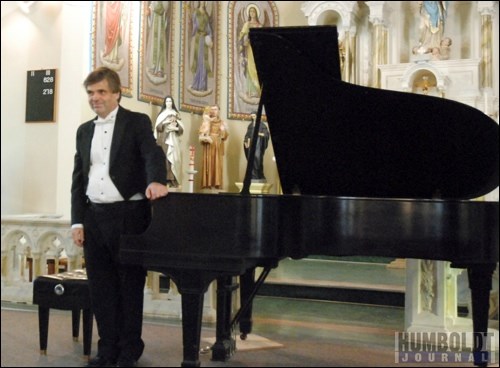On July 13, music of the Romantic era filled Assumption Church in Marysburg when pianist Richard Konrad gave a recital of works by Schubert, Beethoven, Liszt and Bartok.
It was the closing concert of the 2011 Marysburg Festival of the Arts.
With only 50 audience members in the seats, the number in attendance at this fourth concert of the series fell short of artistic director Gregory Schulte's expectation. Although many of those in the audience were from Humboldt, some had even driven from Saskatoon to hear Konrad perform. It was a concert destined to please true classical music fans and the audience showed its appreciation by giving the pianist a standing ovation at the end of his performance.
There is no doubt that the native Manitoban is a polished performer. Konrad's interpretation of all the pieces he chose to play in this program was full of expression and personal engagement. He made full use of the dynamic range offered by the Steinway grand piano, such as the musical style of that period requires.
Konrad credits his family and their Mennonite background for his early interest in music. His mother was an amateur singer, and, the pianist explained, the whole family was influenced by the presence of music in the Mennonite tradition.
After obtaining his degree at the University of Western Ontario, Konrad went on to study in prestigious schools such as the Banff Centre of Fine Arts and the Royal College of Music in London before obtaining his PhD at the University of Indiana.
The music in this recital reflects the style of music the pianist most enjoys playing, especially that of Liszt (1811-1886), whose music he considers to be "adventurous" and "bold and daring in a theatrical way."
Konrad first played a Schubert "Impromptu in B Flat major", based on a theme and five variations. It was a good piece to open with, a gentle, ambling tune that gradually evolves into deeper, more complex harmonies as the variations advance. In the last variation, the repetition of arpeggios sounded like rippling water, that in itself an image evocative of the romantic period.
A piece by Beethoven followed the impromptu. Distinctly different in its musical style, the "Sonata in E flat major" is one of 32 monumental piano sonatas penned by the German-born composer. You could have heard a pin drop in the church during the silences that punctuated the Largo movement, while the delicate, yet firm touch in the Allegro movement had a bright, crystalline quality.
After the intermission Konrad played a piece by 20th century composer Bela Bartok (1888-1945). No longer falling into the Romantic category, the style of Bartok's music has an entirely different harmonic structure. His "Suite op. 14" alternates between tonal and atonal sounds, using series of broken chords with two hands running parallel, an octave apart.
When asked why he had included a composer whose style is so different from the others in the program, Konrad replied that he thought Bartok's music wasn't included often enough in programs.
He said that he felt it was necessary for artists to create some exposure for composers such as Bartok who are less frequently programmed, because theirs is also a language to be learned.
The rest of the recital was devoted to the music of Liszt, and included two pieces with a sacred theme and the eleventh of his Transcendental Etudes.
The romantic, bohemian style of the etude was a stark contrast to the two sacred pieces, both of which illustrate the persecution of Christians and of Christ on the cross, Konrad told the audience.
In spite of its gloomy theme, "Vexilla Regis Produent" had a simple melodic line that evoked lightness, and alternated with contrasting heavy chords, typical of many of Liszt's compositions. His closing piece, "Variations" (on a theme by Bach), blended the harmonic counterpoint of the 17th century composer's music with the deep, rich cadences common to the music of Liszt's time.
In all, it was a well-balanced program that for two hours transported the audience back to the Romantic era.




